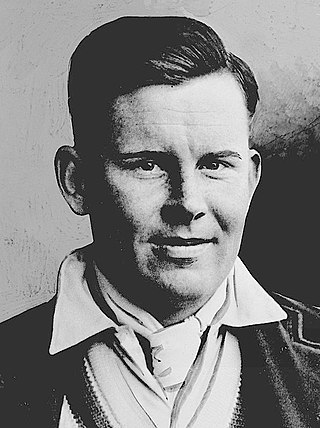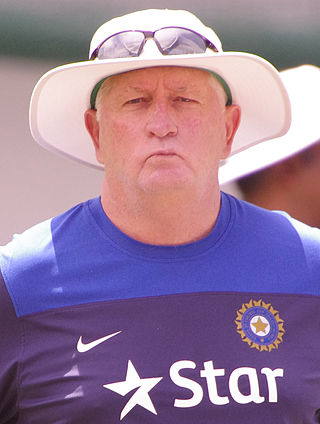Related Research Articles

The Ashes is a men's Test cricket series played biennially between England and Australia. The term originated in a satirical obituary published in a British newspaper, The Sporting Times, immediately after Australia's 1882 victory at The Oval, its first Test win on English soil. The obituary stated that English cricket had died, and that "the body will be cremated and the ashes taken to Australia". The mythical ashes immediately became associated with the 1882–83 series played in Australia, before which the English captain Ivo Bligh had vowed to "regain those ashes". The English media therefore dubbed the tour the quest to regain the Ashes.

The Barmy Army is a travel agency that provides tickets and arranges touring parties for some of its members to follow the English cricket team in the UK and overseas. The Barmy Army was at first an informal group but was later turned into a company limited by guarantee, registered in England and Wales. The name is also applied to followers of the team who join in with match day activities in the crowd, but do not necessarily travel as part of an organised tour. Collins dictionary defines the word barmy as "slightly crazy or very foolish". Known for their famous song that goes “barmy army shout it out come on england”

Glenn Donald McGrath is an Australian former international cricketer whose career spanned 14 years. He was a fast-medium pace bowler and is considered one of the greatest bowlers of all time along with the title of most accurate pace bowler of all time and a leading contributor to Australia's domination of world cricket from the mid-1990s to the late 2000s. McGrath was a member of the Australian team that won three consecutive World Cup trophies in a row, winning the 1999 Cricket World Cup, the 2003 Cricket World Cup, and the 2007 Cricket World Cup. In the 2003 final, he took the winning wicket of Zaheer Khan. McGrath was also a member of the team that won the 2006 ICC Champions Trophy.
The Ashes series, similar to the cricket series of the same name, was a best-of-three series of test matches between Australia and Great Britain national rugby league football teams. It had been contested 39 times from 1908 until 2003 largely with hosting rights alternating between the two countries. Since 1973, Australia has won a record thirteen consecutive Ashes series.

The England men's cricket team represents England and Wales in international cricket. Since 1997, it has been governed by the England and Wales Cricket Board (ECB), having been previously governed by Marylebone Cricket Club since 1903. England, as a founding nation, is a Full Member of the International Cricket Council (ICC) with Test, One Day International (ODI) and Twenty20 International (T20I) status. Until the 1990s, Scottish and Irish players also played for England as those countries were not yet ICC members in their own right. England are the current ICC Men's T20 World Cup champions.

Frederick Richard Brown was an English amateur cricketer who played Test cricket for England from 1931 to 1953, and first-class cricket for Cambridge University (1930–31), Surrey (1931–48), and Northamptonshire (1949–53). He was a genuine all-rounder, batting right-handed and bowling either right-arm medium pace or leg break and googly.

Duncan Andrew Gwynne Fletcher is a Zimbabwean cricket coach and former cricketer, who has coached the England and Indian national teams. He led the Indian team to be the winners of the 2013 ICC Champions Trophy, where the team was undefeated during the tournament.
Gary Joseph Pratt is an English former professional cricketer, who played as a left-handed batsman but also bowled right-arm off breaks. He is best known for running out Australia captain Ricky Ponting having come on as a substitute fielder in the fourth Test of England's 2–1 series victory in the 2005 Ashes.

Ian Jonathan Leonard Trott is a South African-born English former professional cricketer who played international cricket for the England cricket team and is the current head coach of the Afghanistan cricket team. Domestically, he played for Warwickshire County Cricket Club as well as playing in South Africa and New Zealand. He was ICC and ECB Cricketer of the Year in 2011.

Mitchell Guy Johnson is a former Australian cricketer, who played all forms of the game for his national side. He is a left-arm fast bowler and left-handed batsman. He represented Australia in international cricket from 2005 to 2015. Johnson is considered to be one of the greatest fast bowlers of his era and is referred as the most lethal bowler of all time. With his time representing Australia, Johnson won multiple ICC titles with the team: the 2007 Cricket World Cup, the 2015 Cricket World Cup, the 2006 ICC Champions Trophy, and the 2009 ICC Champions Trophy.
An Aussie Goes Barmy is an Australian reality television series which aired on the pay TV channel FOX8 in 2006. The series featured Australian cricket fan Gus Worland infiltrating the Barmy Army, an organised group of supporters of the England cricket team.

The McGrath Foundation is a breast cancer support and education charity in Australia, which raises money to place McGrath Breast Care Nurses in communities across Australia and increase breast health awareness. The charity was founded by Australian cricket player Glenn McGrath and his English-born wife, Jane McGrath, in 2005, following Jane's initial diagnosis and recovery from breast cancer. Jane died on 22 June 2008 at the age of 42.
Victor "Vic" Flowers is a cricket supporter from Oldham, England and is often referred to as the unofficial leader of the Barmy Army. He was also known as Jimmy due to bearing a resemblance to Jimmy Savile.

Billy Cooper, also known as Billy The Trumpet, is a cricket supporter, best known as the trumpet player for the Barmy Army.

Michael Gertges Neser is an Australian professional cricketer. In domestic cricket, he represents Queensland, and the Brisbane Heat in the Big Bash League, as well as Glamorgan in the County Championship, Royal London One-Day Cup and T20 Blast. He made his international debut for Australia in June 2018.
The Bharat Army is a group of Indian cricket fans supporting the Indian national cricket team in both domestic and international matches. It is considered as Indian equivalent of Barmy Army.
"That's In Queensland" is an Australian song and viral video by comedian Denis Carnahan. The song parodies the selection of the Queensland State of Origin team for the annual rugby league State of Origin series.
The England–Australia sporting rivalry is one which spreads across multiple sports and can be traced back as far as 1868.
References
- 1 2 "BARMY ARMY by BACSC Ltd and Peacock, David John - Australian Trademark No.1114806". Trade Marks Australia. Retrieved 2020-03-23.
- 1 2 "Profile: Choir master - Paul Burnham, Chief organiser, Barmy Army". Campaign. 2005-09-14. Retrieved 2013-03-23.
- ↑ "Player Profile". The Trevor Trophy. 1985-09-05. Retrieved 2013-03-23.
- 1 2 Carter, Ben (2005-09-14). "Profile: Choir master - Paul Burnham, Chief organiser, Barmy Army - Marketing news". Marketing Magazine. Retrieved 2013-03-23.
- ↑ "Old Hamps knock spots off Richmond". Harrow Times. 2000-05-26. Retrieved 2013-03-23.
- ↑ "Not barmy, just lucky". In the News. Archived from the original on 2014-01-07. Retrieved 2013-03-23.
- ↑ "Special report: From fan club to Barmy Army Ltd". New Zealand Herald. 2013-03-20. Retrieved 2013-03-23.
- ↑ "Paul 'leafy' Burnham and members of the Barmy Army present a cheque". ESPN. Retrieved 2013-03-23.